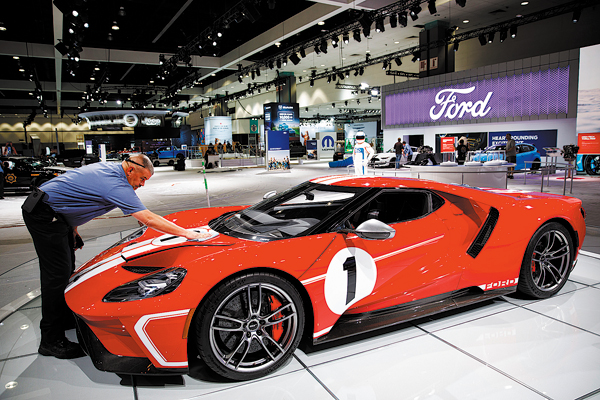United States' annual sales dip, but market remains buoyant

NEW YORK-Automakers reported on Wednesday the first annual decline in United States car sales since the end of the financial crisis, a dip offset by continued strength in sales of trucks and other large vehicles.
The three leaders in the US market-General Motors, Ford and Toyota-all reported modest declines in 2017 compared with the sales records set in 2016.
The results put an end to the US auto industry's eight-year streak of increases, as the national total slipped 1.5 percent to 17.23 million, according to Autodata.
The winning streak "was the result of pent-up demand after the recession that's finally just running out," said Tim Fleming, an analyst at Kelley Blue Book.
Automakers had been bracing for the sales gains to come to an end for the last couple of years, but that was averted in 2016 in part by heavy incentives implemented late in the year to unload excess inventory.
Despite the decline, analysts note that sales above 17 million is still very strong.
The US auto industry continues to enjoy strong demand for larger vehicles, including SUVs, pickup trucks and "crossover" models.
Larger vehicles are grabbing even more market share from sedans, which Kelley estimated made up just 36 percent of the US market last year, down from 50 percent in 2012.
GM's annual sales fell 1.3 percent to 3 million vehicles last year, but the biggest US automaker said continued strength in larger crossover vehicles and trucks had helped lift the average retail price for all vehicles to a record $35,400 in the final month of the year.
Ford's sales fell 1.1 percent to 2.6 million compared to 2016, but it reported a surprise increase in December, fueled in part by the continued success of the F-Series pickups and other large vehicles.
The average price of the bestselling F-Series came in at $47,800, a new record, marking an "unbelievable year" for the model, Ford Vice-President Mark LaNeve said.
Toyota, saw US sales drop 0.6 percent to 2.4 million, but the company highlighted strength in its popular Camry sedan, the RAV4 crossover and SUVs.
Fiat Chrysler did not release year-end figures, but its December sales fell 11 percent to 171,946, a bit below the level projected by Edmunds, but above the forecast by Kelley Blue Book. Sales were hit by lower sales to car rental companies.
Honda's US sales rose 0.2 percent for the year to 1.6 million. Nissan's 2017 sales also came in at 1.6 million, a 1.9 percent increase from the prior year.
Bullish on 2018?
Some in the auto world remain bullish about 2018, pointing to the benefits from the US tax cut that US President Donald Trump signed into law last month.
"In 2017, we had solid GDP growth and good news on employment, wages and consumer sentiment, which helped deliver very strong retail sales for the auto industry," GM Chief Economist Mustafa Mohatarem said.
"This year, many consumers will see their take-home pay rise because of tax reform. That will keep the broad economy growing, and help keep sales at very healthy levels even as the Fed increases interest rates."
Countering that trend, analysts say, are the interest rate increases expected by the Federal Reserve that will boost lending costs for consumers.
Fleming of Kelley Blue Book also pointed to an expected influx of vehicles leased during the financial crisis and its aftermath that will enter the used car market, depressing demand throughout the industry. "The numbers point to further decline," said Fleming, who is projecting vehicle sales to fall to 16.7 million vehicle sales this year.
AFP

